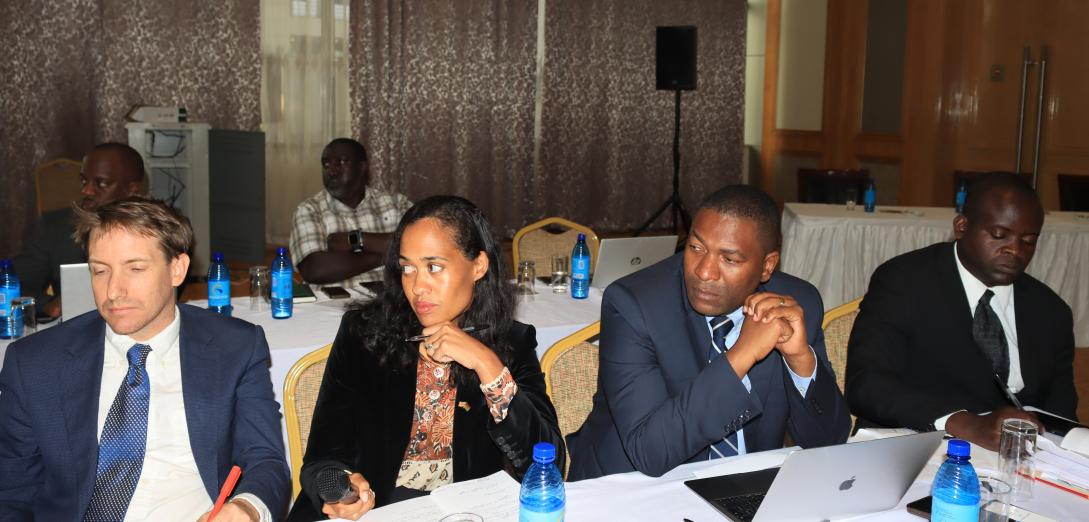Development Partners and Government review performance in agriculture in the face of shocks

The meeting was co-chaired by the Minister of Agriculture Honorable Sam Kawale, and the Acting British High Commissioner, Olympia Wereko-Brobby. The annually held Joint Sector Review is one of the key processes to enhance mutual accountability and joint sector assessment of the funding commitments and results as one of the principles in the Comprehensive Africa Agriculture Development Program (CAADP) and Malabo agreement by the Heads of States and Government under the African Union (AU).
Under the CAADP framework, the Malawi Government committed to a 10% budget allocation to the agricultural sector and achieving a 6% annual agricultural growth target. However, in the year under review (Fiscal Year 2023/24), the agriculture sector registered a low 0.8 percent growth rate, a slight decline from the previous year’s performance of 0.9 percent. This is very worrisome considering that the government has continued allocating the minimum 10 percent to the agriculture sector, and funding from both government and development partners have increased their allocations to the sector in the year under review. For example, in the 2023/24 season, Agricultural Production Estimate Survey (APES) recorded declines in maize production by 22.7 percent, millet by 32.3 percent and sorghum by 35.6 percent largely due to the El Nino drought.
In her statement on behalf of the Donor Committee for Agriculture and Food Security (DCAFS), the Acting British High Commissioner Ms. Olympia Wereko-Brobby, welcomed the ongoing AIP reforms that reduce its fiscal cost but noted the ongoing need to pursue reforms to improve its focus on soil health to increase productivity. In addition, she emphasized the need for support towards structured markets to boost trade and exports. She also noted the continuous need to improve the enabling environment through economic management to improve forex availability, lower interest rates, and free up lending to the private sector, which are all critical aspects to drive investment and performance of the agriculture sector.
The Minister of Agriculture, Sam Kawale, confirmed that the government has made strides over the years in undertaking reform of the AIP by, among others, reducing the targeted farmers from 3.7 million four years ago to 1.1 million in the 2024/2025 farming season. In addition, he noted that AIP will aim to target productive farmers selected from the National Agriculture Information System (NAMIS), an improved farmer database supported by the World Bank, that categorizes farmer groups. He pointed out that targeting the productive farmers with limited capacity to buy farm inputs allows the government to graduate other farmers to commercial farming to access farm input loans and grants from various instruments such as NEEF loans, AGCOM II, SAPP II and AGRA Youth Entrepreneurship program. He further highlighted that non-productive farmers weaned from the AIP would be linked to social protection programs.
He also confirmed the urgent need for Development Partners and the Government to collectively explore how best to create a good enabling environment for agricultural production, support commercial farming particularly in irrigation, invest in extension and crop insurance, and focus on priority value chains. The Minister bemoaned the lack of coordination in piecemeal support to various value chains which undermines joint efforts.
The engagement comes amid mounting pressure on the government to feed about 5.7 million food-insecure people in the 2024-2025 consumption year. His Excellency Lazarus McCarthy Chakwera declared a state of disaster on 23 March 2024 in 23 districts and appealed for local and international assistance. The El Nino response appeal outlined $447 million in requirements to address needs in boosting crop production and food stocks as well as provide humanitarian assistance in six months (October 2024 to March 2024).
The 2023/2024 agriculture sector performance report acknowledges the increasing assistance by the Development Partners to the sector, which recorded a US$511.94 disbursement in the 2023-2024 fiscal year, an increase from US$340.87m in the preceding year. Through 89 various projects spread across 5 to 6 years, the total DP commitment to the agriculture sector is about US$2,503.18 million. Ms. Olympia Wereko-Brobby urged the Development Partners to further strengthen collaboration and coordination to jointly deliver better results. This call was echoed by the Minister, who urged the need for a more balanced approach in reporting that better captures efforts being made by DPs and the government in future Joint Sector Reviews. He further called on reporting on investments in irrigation, structured markets, patient financing, commercial farming and organic fertilizer use.





